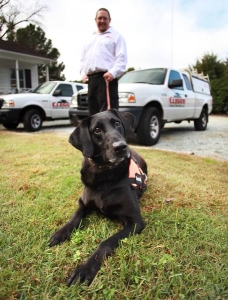The dogs use smell to determine where the bed bugs are, how much the area needs to be treated, and whether they’re still there after the treatment is over.
STAFF WRITER |TUESDAY 12 NOVEMBER 2013

“Now they’re everywhere,” said Phil Clegg, the president of the termite and pest control company. The company, started in 1964, now has a third generation of the Clegg family working at the business.
Clegg’s father, the Rev. Ralph Clegg, was a Baptist minister. Clegg said his father got into termite control when professional prices were more than the church could afford. According to the company’s website, Ralph Clegg and church members treated the church for termites themselves after consulting with an N.C. State University expert.
By the time his father retired from the ministry, the company had grown to a sustainable size, Clegg said. Clegg joined the company in 1970. He said his son is now vice president.
While the company got its start in termite control, Clegg said its pest control business is now larger.
And in recent years, he said, he’s seen growth in one sector in particular: bed bugs.
“In our area, they’re more prevalent than they were three years ago, and every year they get worse,” Clegg said.
The company’s bed bug treatment business has “increased rapidly” in the past few years, he said. He said the company has found them in apartment complexes, motels, college dorms, and in public places like movie theaters.
The company uses chemical as well as non-chemical treatments to kill bed bugs, and to help with detection, it has acquired two trained bed-bug-sniffing dogs.
The company acquired its first, a chocolate Labrador retriever named Rambo, in June of last year. Rambo is based in Greenville does most of his inspections in eastern North Carolina, according to information from the company.
In August of last year, the company acquired Smoke, another black Lab. Smoke is based in the company’s Durham office.
“Dogs are quite expensive, and you’ve got to have a trainer that understands the dogs,” Clegg said, explaining that they help speed the detection process. “It does take a long time to do an inspection,” he added. “With the dogs, bed bugs do give out a very definite scent, and the dogs can pick up the scent very quickly.”
The dogs were both trained by the owner and operator of Greenville-based Bullock’s K-9 Training. Mike Bullock, company owner, said he’s been training dogs for about 25 years, but he started training dogs for bed bug detection about three years ago.
Bullock said that most of the dogs he’s trained for bed bug detection have gone to more northern locations, such as New York.
The dogs use smell to determine where the bed bugs are, how much the area needs to be treated, and whether they’re still there after the treatment is over. Jung W. Kim, environmental senior specialist, entomologist, and bed bug specialist who works for the N.C. Department of Agriculture and Consumer Services, said in an email that the bed bug resurgence in the country mostly likely started in the late ’90s or early 2000s in hotels.
According to a 2013 Nation Pest Management Association survey of pest management professionals, 99.6 percent of respondents said they had encountered a bed bug infestation in the past year.
The “2013 Bugs Without Borders Survey” was conducted by the association and the University of Kentucky. Prior to 2000, only 25 percent of respondents said they had encountered one.
Jung said consumers need to use caution in finding the best company for bed bug treatments.
“If you hire the wrong company, you may not be able to control your bed bug problem,” he said. “Just like any other consumer product, market research, reviews, and reputation of companies may help consumers to find more reliable companies for their bed bug control.”
Jung suggested that consumers ask pest control company officials about their treatment options as well as their experience with bed bugs, success rates, and their warranty options.
Jung said a bed-bug inspection could be a two-step process, with a visual inspection or canine inspection, or finding them through signs of an infestation. Once something is detected, he said the confirmation step should be to find live bed bugs.
Trained dogs can be used to detect them if a dog and handler have good communication, Jung said. He said accuracy depends on training, the dog’s health, and the maintenance of a dog’s detecting ability.
“According to a canine expert, the accuracy varies widely,” he said. “Consequently, our division is working on a possibility of our state certification for the canine bed bug inspection teams.”
Heraldsun
